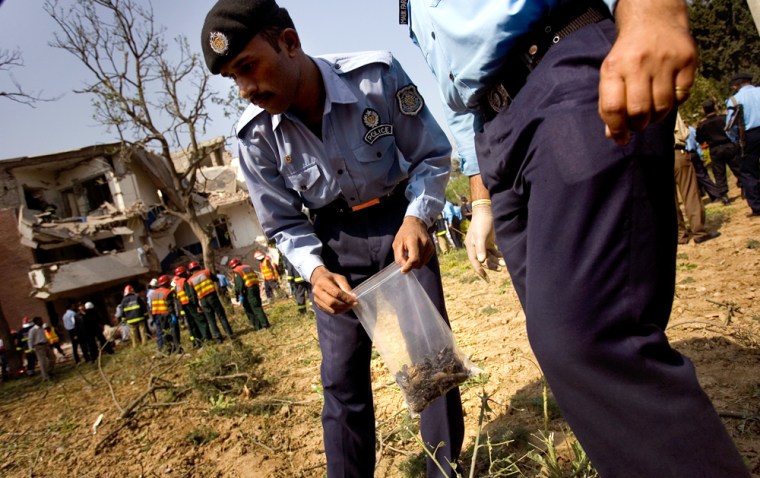Bombings killed 10 people and wounded at least 14 in Pakistan on Thursday, including an attack at a police complex in the capital the same day lawmakers huddled for a private briefing on the militant threat facing the country.
The other blast was in the nation's volatile northwest, where al-Qaida and Taliban militants have established bases near the Afghan border.
Four children, two police and four prisoners died when a roadside bomb exploded under a prison vehicle in the Dir region, government official Sher Bahadur Khan said. Initial reports indicated a school bus was caught in the blast, but others said the children were walking. Ten people were wounded.
Meanwhile in Islamabad, an apparent suicide car bombing severely damaged an anti-terror squad building and wounded at least four police in the heavily guarded Police Lines area. The explosion occurred just moments after a man delivered sweets to the facility, and police were examining whether the events were linked.
Some body parts were found that might belong to a suicide bomber, Islamabad Police Chief Asghar Gardaizi said.
Later Thursday, a bearded man wearing a burqa — the all-encompassing woman's veil — prompted a security scare at the Islamabad airport, security official Safdar Hussain said. He said the man was detained and being interrogated but declined to provide any other details.
Increase in attacks
In recent weeks militants have stepped up attacks on security, government and Western targets in Pakistan, reaching well beyond the northwest border areas. A Sept. 20 suicide truck bombing in Islamabad killed 54 and severely damaged the Marriott Hotel.
The latest incident in Islamabad occurred amid tight security for the lawmakers' briefing in Parliament. No one immediately took responsibility for the attack.
Ambulances streamed into the smoke-filled police complex after the blast.
The front section of the three-story, red-brick building was destroyed and a staircase had collapsed. Shoes were strewn among the rubble. Gardaizi said at least four people were hurt; others put the wounded toll as high as nine.
Attack linked to sweets delivery?
Police commando Gulshan Aftab told The Associated Press he was sitting at a nearby barrack when a "Suzuki car hit the anti-terror squad barrack and exploded with a big bang."
He said the main building was largely empty because many officers were guarding Parliament and other areas of Islamabad.
"About 10 people were inside at the time, and we saw six or seven injured," he said.
Gardaizi said a man in a green car had driven up to the building, entered and handed the boxes of sweets to a person inside. He later left the building, and within moments, the explosion occurred, Gardaizi said.
It was unclear what happened to the delivery man. Gardaizi said authorities would investigate why a civilian vehicle was allowed in the area.
The attacks in Islamabad and Dir drew condemnation from the prime minister. Pakistan's military says suicide attacks have killed nearly 1,200 people since July 2007, most of them civilians.
The statistics also said 1,368 security force personnel had been killed since late 2001, when Pakistan's former military ruler, President Pervez Musharraf, allied the country with Washington in its war on terror.
The new civilian government called the joint Parliament session in an effort to build a national consensus on the Muslim nation's role in that U.S.-led war.
Many in Pakistan believe the alliance with the United States has increased violence in their nuclear-armed country. The United States has shown impatience with Pakistan by launching cross-border missile strikes in the northwest, where al-Qaida leader Osama bin Laden is rumored to be hiding.
Briefing for lawmakers
On Wednesday, lawmakers were shown images of militants killing people, according to two attendees who requested anonymity because, like others at the meeting, they were sworn to secrecy. Statistics on militancy were also given, one said, declining to divulge specifics.
Ahmed Shujaa Pasha, an army general tapped to take over Pakistan's main spy agency in the coming days, led the briefing. The topics included Pakistan's military offensives against insurgents in tribal regions bordering Afghanistan.
Thursday's portion of the briefing was devoted to questions, but many lawmakers walked away unhappy, complaining that much of the data shared was already available in media reports.
Khurram Dastagir, a lawmaker from the opposition party of ex-Prime Minister Nawaz Sharif, told Dawn News channel that legislators wanted to know if there was any agreement between Pakistan and the United States in the fighting militants.
Analysts have speculated that the previous government of President Pervez Musharraf might have had a spoken deal allowing the United States to strike terrorist targets on Pakistan's soil.
"We would like to know what agreements have been made, what understandings_ if there is no written agreement as we have been told — what understandings have been given to the U.S.," Dastagir said.
He said Pasha had declined to answer some questions because they were policy-related.
The session is expected to resume Monday.
